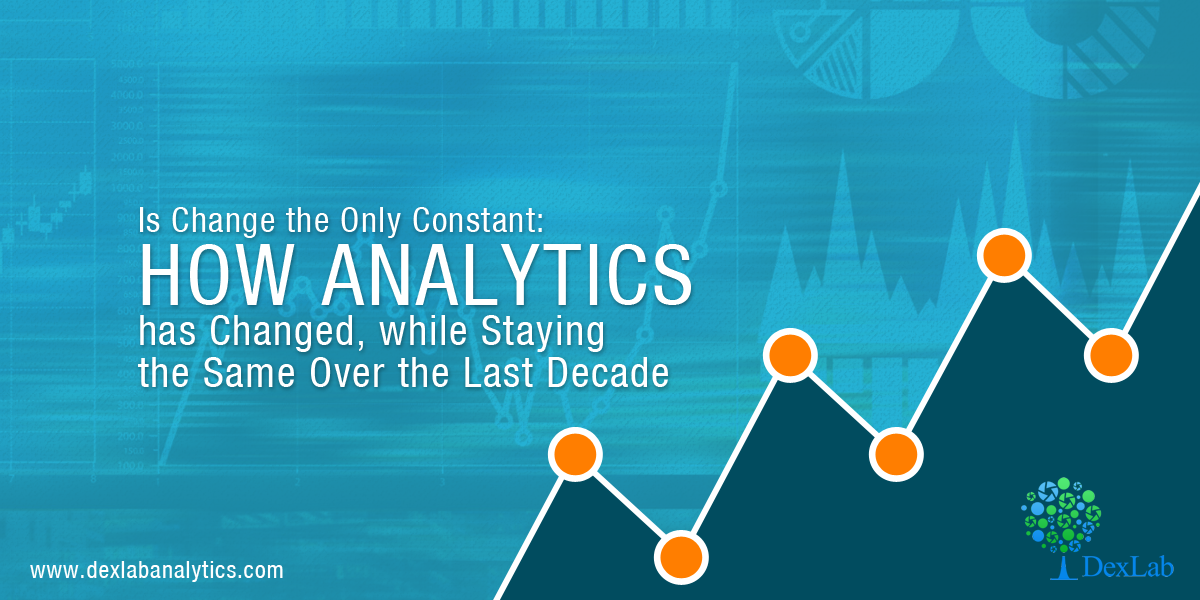Data analytics is evolving. Coupled with Big Data, it is changing the topography of almost everything.
Each year, more and more companies are allocating their time and budget to exploit and understand vast pools of data strewn across them, both inside and outside company files. Of course, Big Data and Analytics is selling like a hot cake today, but what is its story of evolution? How the technology flourished 10 years back?
Thankfully, in analytics not everything has changed. Some of the efficient technologies that were developed 10 years back are still in use, yet you can witness a large set of changes that have taken place – besides witnessing a change in analytical leadership, management and culture, there’s a lot more to talk about the technology change.
Besides bringing upon hardware advances, the pressing need to harness and process information in better ways led to the development of open source software, like Hadoop and other scripting languages. In all this, Hadoop is like the best storage device that excels in processing big data – today a lot of organizations are exploiting the bounties of Hadoop in the form of Hadoop-inspired data lakes to preserve data in their original formats unless and until they are being asked to be structured or analyzed.
As most of the data remains unstructured, data scientists need to find out some ways to turn them into structured and ideal for statistical analysis, thanks to terrific scripting languages – Hive, Python and Hive. Some more-advanced open source tools, like Spark and R have also garnered a lot of accolades. The very process of appropriating and implementing such in-demand open source software is in itself a great job to consider across business dimensions.
Having said that, there are many such organizations too that want to integrate data analytics with fetching production applications. They might place their bet on technologically robust CRM systems; they works best in ascertaining the lifetime value of a customer. While addressing the technology of analytics, another key component, known as ‘microservices’ stems out to be immensely helpful.
Today, this embedded approach came to be known as ‘streaming analytics’ or ‘analytics at the edge’ – with an increasing importance of internet of things, analysis of data is an exploding practice today. Autonomous analytics, another budding technology of analytics is shaping the landscape all over, in the form of Artificial Intelligence or Cognitive Technology. Before, humans were required to make decisions and churn out output, but now the reels of time are changing. Machines intelligence is given more acute importance as compared to human intuition; machine learning technology leads the next big step and adopts the recommended action.
The same thing is applicable for Information Technology – it’s time to bid goodbye to mainframe computers, though various companies are still relying on the traditional modes of computing, like spreadsheets, visual analytics, and statistical packages and data warehouses. However, a lot of companies have started exploring open source software, though the numbers are less.
The change in the analytics world is robust and extensive. Beyond doubts, the present scenario of analytical technology is excessively powerful and costs less expensive. In a nutshell, the boats of analytics have started sailing and are riding high!
However, data analytics is a broad term, and quite complex to understand for a novice. As analytics have grown over the last few years, the need to be data-proficient has increased manifold. For such compelling needs, DexLab Analytics with its incredible business analysis training in Pune is here. Peruse through their Data Science Certification in Pune, it is also quite popular.
Interested in a career in Data Analyst?
To learn more about Machine Learning Using Python and Spark – click here.
To learn more about Data Analyst with Advanced excel course – click here.
To learn more about Data Analyst with SAS Course – click here.
To learn more about Data Analyst with R Course – click here.
To learn more about Big Data Course – click here.
Big data training, Business analysis training, business analytics, data science, Data Science Certification, Data Science Courses, Hadoop, hadoop training in Pune



Comments are closed here.